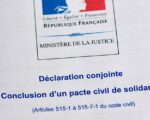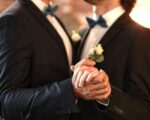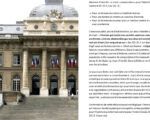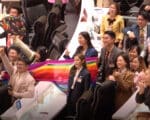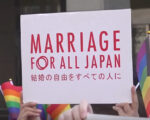Un studio photo du Nouveau Mexique avait été reconnu coupable de violation des lois antidiscriminatoires.
>> Supreme Court declines case of photographer who denied service to gay couple
La Cour Suprême des Etats-Unis a refusé lundi de se prononcer sur l’affaire d’une entreprise condamnée pour avoir refusé de servir un couple homosexuel, un choix salué par les organisations gays. La plus haute instance judiciaire américaine avait été saisie après une plainte contre un studio de photographie, Elane Photography, qui refusait de photographier le mariage d’un couple d’homosexuelles, au nom de la liberté d’expression. Le couple propriétaire du studio situé à Albuquerque (Nouveau-Mexique, sud-ouest) avait été reconnu coupable de violation des lois antidiscriminatoires de l’Etat et avait été fait appel.
Human Rights Campaign, association pour les droits des gays, a salué ce choix de ne pas intervenir en estimant que «la Cour Suprême renforce l’application des lois antidiscrimination».«Quand des entreprises ouvrent leurs portes au public, elles doivent appliquer la loi et n’en sont pas dispensées au nom de leurs croyances personnelles», a-t-elle ajouté.
L’organisation familiale Family Research Council a au contraire estimé ce choix «choquant». La Cour Suprême «pense-t-elle que le prix à payer de la citoyenneté est de rendre sa liberté de conscience ?», s’est-elle interrogée.
L’affaire était scrutée de près par partisans et opposants au mariage homosexuel alors que des situations similaires avec des traiteurs ou des pâtissiers par exemple, surviennent régulièrement aux Etats-Unis où le mariage gay est de plus en plus légalisé, Etat après Etat.
Dans l’Etat voisin de l’Arizona (sud-ouest), un projet de loi permettant aux entrepreneurs de ne pas servir les clients homosexuels au nom de leurs convictions religieuses avait fait l’objet en février dernier d’un veto de sa gouverneure Jan Brewer.
>> The Supreme Court declined on Monday to consider whether a New Mexico photographer had a right to refuse service to a same-sex couple who wanted her to record their commitment ceremony.
Without comment, the court said it would not review a decision by the New Mexico Supreme Court that the denial of service violated the state’s public accommodations law, which bans discrimination by those offering their services to the public.
More : The case awaiting the justices’ action is one that is inevitably cited when legislators say new laws are needed to protect those who say their religious beliefs would be offended by having to “endorse” same-sex marriage.
It involves a New Mexico couple, Elaine and Jonathan Huguenin, whose company, Elane Photography, refused to be the official photographer for the 2007 commitment ceremony of a lesbian couple, Vanessa Willock and Misti Collinsworth.
The Huguenins, asking the Supreme Court to reverse a lower-court decision, say they would “gladly serve gays and lesbians” — taking portraits, for instance — but do not want to photograph marriage or commitment ceremonies. That would “require them to create expression conveying messages that conflict with their religious beliefs.”
The state human rights commission found that the Huguenins violated the state’s public accommodations law, the New Mexico Human Rights Act, and the New Mexico Supreme Court unanimously upheld the decision.
“When Elane Photography refused to photograph a same-sex commitment ceremony, it violated the NMHRA in the same way as if it had refused to photograph a wedding between people of different races,” the court said.
In their petition, the Huguenins and lawyer Jordan W. Lorence of the Alliance Defending Freedom mention religion frequently. But their plea does not cite constitutional protection of their right to freely exercise their religion. Instead, they rely on another part of the First Amendment: their right to free speech.
The photographs and picture books Elaine Huguenin creates when photographing weddings are her artistic expressions: “She is the person speaking through those images,” her brief states.
If Huguenin is not allowed to refuse to “create expression that would communicate messages antithethical to her religious beliefs,” her petition states, others with similar creative skills “may be co-opted by private parties through government coercion.”
Others who might be affected by the New Mexico Supreme Court’s reasoning include “marketers, advertisers, publicists, website designers, writers, videographers and photographers,” the brief says.
Lorence likes to offer the example of a Jewish tattoo artist who should have the right to refuse to ink “a giant swastika on someone’s forearm.”
Other hypotheticals are offered in an amicus brief supporting the Huguenins that comes from individuals who nonetheless support same-sex marriage: Ilya Shapiro of the libertarian Cato Institute, First Amendment scholar and law professor Eugene Volokh of UCLA, and Dale Carpenter, a University of Minnesota law professor who has written extensively about the same-sex-marriage movement.
“Photographers, writers, singers, actors, painters and others who create First Amendment-protected speech must have the right to decide which commissions to take and which to reject,” they write. Such accommodations can be made without risking that anti-discrimination laws would not apply to others in the marriage industry — “caterers, hotels, limousine service operators and the like.”
They and the Huguenins point to Supreme Court decisions that allow parade organizers to exclude marchers whose message is not in harmony with their own and that protect citizens from having to endorse a government message — even if it is as innocuous as the words “Live Free or Die” on a license plate.
Tobias B. Wolff, a University of Pennsylvania law professor representing Willock, points out in his brief that the Huguenins acknowledge that courts are not split on the questions they raise, normally a prerequisite for Supreme Court action. He said the issue is a simple one:
“Whatever service you provide, you must not discriminate against customers when you engage in public commerce.”
Of course Elaine Huguenin is creative; otherwise, she wouldn’t be able to charge a fee for her service. But when a company sells its goods to the public, “it is not a private actor engaged in the expression of its own message,” Wolff writes. “Customers do not pay for the privilege of facilitating the company’s message. Customers pay to have their own event memorialized.”
The New Mexico Supreme Court agreed. It said the Huguenins could take any pictures it liked and offer them for sale. But once the company put itself out for hire, it could not discriminate in who it would serve.
Lorence said the recent attempts by Arizona and other states to shield religious objectors have drawn more attention to the case. “Suddenly, everyone knows about the New Mexico photographer,” he said.
But Wolff argues in his brief that the issues raised in the recent legislative efforts — how far constitutional protections on the exercise of religion extend — are not raised in Elane Photography v. Willock. He points out that not a single commissioner or judge has yet sided with the Huguenins.
But one New Mexico justice, Richard C. Bosson, noted the difficulty of the balancing.
The Huguenins, he wrote in a concurring opinion, “now are compelled by law to compromise the very religious beliefs that inspire their lives. Though the rule of law requires it, the result is sobering.”
Nonetheless, he added, in the “focused world of the marketplace, of commerce, of public accommodation, the Huguenins have to channel their conduct, not their beliefs, so as to leave space for other Americans who believe something different. . . . In short, I would say to the Huguenins, with the utmost respect: it is the price of citizenship.”
AFP



